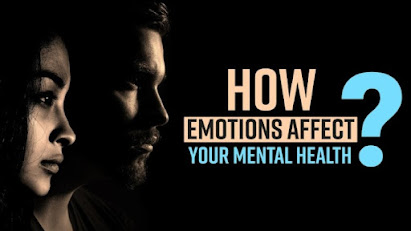- Get link
- X
- Other Apps
The relationship between thoughts, emotions, and health is a complex and interconnected one. Our mental and emotional well-being has a profound impact on our physical health, and conversely, our physical health can influence our thoughts and emotions. In this comprehensive guide, we will explore how thoughts and emotions affect health, and the mechanisms behind this relationship.
1. The Mind-Body Connection:
The mind-body connection is the concept that our mental and
emotional states influence our physical health. This connection is
bi-directional, meaning that not only do our thoughts and emotions affect our
physical health, but our physical health can also influence our thoughts and
emotions.
2. Positive Emotions and Health:
Positive emotions, such as happiness, joy, and contentment,
have a positive impact on health. When we experience positive emotions, our
bodies release "feel-good" chemicals like endorphins and serotonin.
These chemicals can boost our immune system, reduce inflammation, and lower
stress levels. Positive emotions are associated with lower rates of chronic
diseases, longer life expectancy, and better overall well-being.
3. Negative Emotions and Health:
Conversely, negative emotions, such as stress, anxiety,
anger, and sadness, can have detrimental effects on health. When we experience
these emotions, our bodies release stress hormones like cortisol and
adrenaline. Prolonged or chronic stress can weaken the immune system, increase
inflammation, and contribute to a range of health problems, including
cardiovascular disease, gastrointestinal issues, and mental health disorders.
4. The Stress Response:
The body's stress response is a prime example of how
thoughts and emotions affect health. When the brain perceives a threat or
stressor, it triggers the release of stress hormones, preparing the body for a
"fight or flight" response. While this response is essential for
survival in acute situations, chronic stress can lead to an array of health
problems. It can increase blood pressure, weaken the immune system, and
contribute to mental health issues such as anxiety and depression.
5. Chronic Stress and Inflammation:
Chronic stress is closely linked to inflammation, which
plays a significant role in various chronic diseases, including heart disease,
diabetes, and autoimmune disorders. Stress can activate the body's inflammatory
response, contributing to the development and progression of these conditions.
6. The Gut-Brain Connection:
The gut-brain connection is an emerging area of research
that highlights the bidirectional relationship between our digestive system and
our mental and emotional states. The gut contains millions of neurons and
produces neurotransmitters that affect mood and emotions. An imbalance in the
gut microbiome, often associated with stress and poor dietary choices, can
impact mental health and contribute to conditions like irritable bowel syndrome
(IBS) and mood disorders.
7. Psychoneuroimmunology:
Psychoneuroimmunology is the study of how thoughts and
emotions influence the immune system. Research in this field demonstrates that
the mind can modulate the immune response. Positive emotions and a positive
outlook can enhance immune function, while chronic stress and negative emotions
can suppress it.
8. The Placebo Effect:
The placebo effect is a phenomenon where individuals
experience symptom relief or health improvements after receiving a treatment
with no therapeutic value. This effect is believed to be influenced by an
individual's belief in the treatment's effectiveness. The placebo effect
underscores the power of thoughts and expectations in shaping health outcomes.
9. Emotional Suppression and Repression:
Emotional suppression and repression involve consciously or
unconsciously burying or avoiding negative emotions. This coping mechanism can
lead to long-term health issues. When negative emotions are not adequately
processed and expressed, they can manifest as physical symptoms and contribute
to conditions like chronic pain, headaches, and gastrointestinal disorders.
10. Chronic Negative Thought Patterns:
Chronic negative thought patterns, such as rumination and
catastrophizing, can contribute to the development and exacerbation of mental
health issues like anxiety and depression. These thought patterns can reinforce
and intensify negative emotions, leading to a cycle of poor mental health.
11. Stress-Related Behaviors:
Thoughts and emotions can also influence health through the
behaviors they trigger. Stress and negative emotions can lead to unhealthy
coping mechanisms, such as overeating, substance abuse, and a sedentary
lifestyle. These behaviors can increase the risk of obesity, cardiovascular
disease, and other health problems.
12. The Impact of Trauma:
Trauma, whether physical or emotional, can have lasting
effects on both mental and physical health. Unresolved emotional trauma can
contribute to conditions like post-traumatic stress disorder (PTSD), while
physical trauma can lead to chronic pain, disability, and mental health challenges.
13. Mind-Body Interventions:
Mind-body interventions, such as meditation, yoga, and
biofeedback, focus on harnessing the mind-body connection to promote health and
well-being. These practices can reduce stress, improve emotional regulation,
and enhance physical health. For example, mindfulness meditation has been shown
to reduce stress, lower blood pressure, and improve immune function.
14. The Role of Social Support:
Social support plays a crucial role in the relationship
between thoughts, emotions, and health. Strong social connections and a support
system can mitigate the negative impact of stress and negative emotions.
Feeling supported and connected can improve mental and physical health
outcomes.
15. Place of Therapy and Counseling:
Therapy and counseling provide individuals with the tools
and support to address negative thought patterns, process emotions, and develop
healthier coping strategies. Cognitive-behavioral therapy (CBT) is one example
of a therapeutic approach that helps individuals identify and change negative
thought patterns.
- Get link
- X
- Other Apps

Comments
Post a Comment